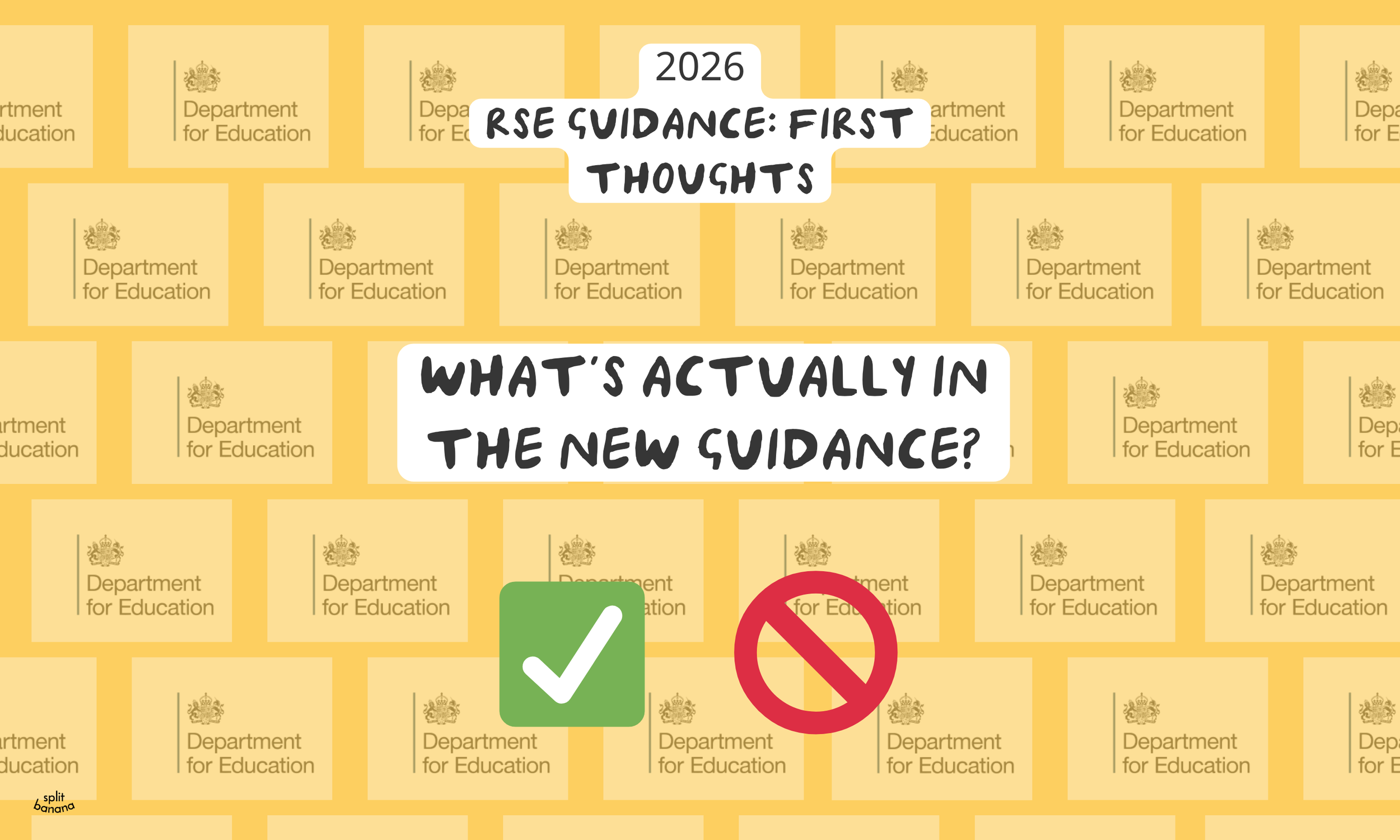First Reflections on the 2025 RSE Guidance
We finally had the headspace to sit with the new RSE guidance - and here are some early reflections.
There’s a lot to welcome. The tone feels less fear-based, more descriptive, and it uses the widely recognised ‘age and stage’ pedagogy rather than arbitrary age restrictions. A positive shift which will hopefully make it easier for teachers to deliver with confidence.
But there are still notable gaps - ones that don’t reflect the realities of what we see in the classroom - and some choices that feel politically, rather than pedagogically, motivated.
✅ What we’re glad to see:
Acknowledgement that sex should be positive and enjoyable — not just risk-managed.
If sex feels unpleasant or unwanted, it needs to be addressed. Naming this is a vital step in helping young people to have mutually positive sexual experience, free from shame and judgement.
A move beyond “just consent” to sexual ethics, values and communication.
Consent is finally treated as a baseline. Sexual experiences should be rooted in care, kindness and respect - and we’re BIG fans of this more values-led approach. (Check out our free resource [here]!)
Parental engagement is now required, and student input recommended.
There is much evidence to demonstrate that participatory approaches form the bedrock of relevant and inclusive RSE. We’d love to see student engagement embedded within policy too.
Stronger guidance on online safety, including AI, subcultures and image-based abuse.
The inclusion of deepfakes, misinformation, AI and harmful online subcultures reflects what we’re regularly asked about - by both students and staff. This feels grounded in real classroom experience.Support for young people worried about their own behaviour.
RSHE isn’t just about spotting harm in others — it’s about recognising our own boundaries, impulses and responses. The recognition of the need to manage our own difficult feelings, such as rejection and disappointment, suggests a more skills-based approach.
🚫 What’s still missing:
A broader, more inclusive lens on gender-based violence.
There’s a strong thread of addressing misogyny running through the guidance — but little mention of how gendered violence also affects trans, non-binary and gender non-conforming young people, despite them facing the highest rates of peer abuse.It also overlooks how homophobia and entrenched views on masculinity prevent many boys and men from recognising or reporting abuse. We can’t tackle gender-based violence without addressing it’s full spectrum.
Clearer guidance for supporting gender-questioning students.
We are once more left with greater uncertainty around how teachers meant to answer questions about gender identity, if they’re not allowed to mention it? Or, how can we explain the protected characteristic of gender reassignment - or anti-trans discrimination - without clarity on what those terms mean? Basic teaching practice starts with explaining key terms!Unfortunately, this section feels less like education policy or practical classroom advice, and more like political compromise.
More practical detail for teaching SEND students.
The guidance says content should be made “accessible” to young people with SEND — but once again offers no clear structure or tools for how. This offers little to improve the state of RSE for SEND young people.No new investment.
The scope of RSHE has grown, but the funding hasn’t. With schools already under pressure, expecting more without meaningful resourcing undermines the quality and impact of the subject.No commitment to post-16 provision
This is a crucial time when many young people are navigating their first relationships, sexual experiences and growing independence — yet there is still no commitment to RSHE for this age group. Despite increasing calls for targeted support, the guidance overlooks the needs of post-16 learners, particularly those in colleges, alternative provision or with SEND. Without tailored content and provision, we risk leaving a large and diverse group without the knowledge, skills and support they need for safe and fulfilling relationships.
Pornography guidance still doesn’t feel relevant enough.
While it’s positive that the new guidance recognises pornography can depict unrealistic and harmful behaviours, it stops short of addressing how young people actually engage with it. There’s no support for educators on how to discuss porn in a way that’s relatable, shame-free, or rooted in critical media literacy. It also fails to mention the full spectrum of harms — including racism, transphobia, and fatphobia — or to contextualise porn as a form of sex work, which could open up space for broader conversations about consent, labour, and representation.
Ultimately, this guidance reflects an ongoing tension between evidence-based RSHE - rooted in young people’s real experiences and participation - and the limits of political will.
We’ll be spending the summer digesting what this means in practice, so we can return in September with the clearest possible guidance, training and workshops for schools.
🍌 Are you concerned about what this means for you or your school? 🍌
Book a call with Matilda to discuss how we can help you to deliver relevant and inclusive RSE.

